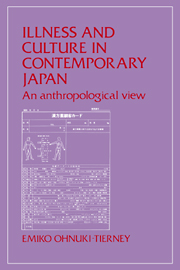Book contents
- Frontmatter
- Contents
- List of illustrations
- Acknowledgments
- 1 Introduction
- Part I Basic concepts and attitudes toward health and illness
- 2 Japanese germs
- 3 My very own illness: Illness in a dualistic world view
- 4 Physiomorphism (somatization): An aspect of the Japanese illness etiology
- Part II Medical pluralism
- Summary
- References
- Index
3 - My very own illness: Illness in a dualistic world view
Published online by Cambridge University Press: 12 January 2010
- Frontmatter
- Contents
- List of illustrations
- Acknowledgments
- 1 Introduction
- Part I Basic concepts and attitudes toward health and illness
- 2 Japanese germs
- 3 My very own illness: Illness in a dualistic world view
- 4 Physiomorphism (somatization): An aspect of the Japanese illness etiology
- Part II Medical pluralism
- Summary
- References
- Index
Summary
The concept of jibyō
With their persistent emphasis on hygiene, one might expect that the Japanese would perceive themselves as clean and healthy; after all, they try so hard to avoid contamination with cultural germs. But the opposite is actually true: Many Japanese regard themselves as somewhat less than healthy, if not sickly. Conversations and greetings frequently relate to the topic of illness, either of the participants or of mutual acquaintances. During the heyday of culture-and-personality and national character studies, an American anthropologist described this tendency as “hypochondria.”
Caudill, an American scholar most sympathetic to Japanese culture, once described his reaction to this pattern (1976a: 162):
As my first year [1954] in Japan progressed, I found myself increasingly bewildered and irritated by the number of times research assistants or friends would not carry out work or would miss engagements because they were “suffering from being sick.” Subsequently, over the following 17 years, I have come to accept this sensitivity about the body and its minor ailments as part of ordinary Japanese character structure.
Today, one of the most popular borrowed English terms is daun, or “down,” which means to be sick, usually in bed. A greeting between two acquaintances will frequently go as follows:
A: Ohisashiburi desu ne (I haven't seen you for a while).
B: Gobusata shimashita (I am sorry for not getting in touch with you for so long). Jitsuwa chotto daun shitemashite ne (Well, I have been daun for a while).
These conversations are one of the best grassroots channels for the dissemination of information about good doctors, hospitals, medicine, and treatments.
- Type
- Chapter
- Information
- Illness and Culture in Contemporary JapanAn Anthropological View, pp. 51 - 74Publisher: Cambridge University PressPrint publication year: 1984
- 2
- Cited by

